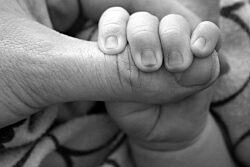Helpful bacterium shown to fortify newborns’ immune system in animal model

Among newborn infants, intestinal infections can be quick and dangerous. A University of Florida Health researcher has now shown that a beneficial bacterium fortifies the nascent immune system to fight these infections in mouse models.
The bacterium is derived from gut microorganisms found in breastfed human infants. It works by reducing inflammation that leads to necrotizing enterocolitis, which destroys intestinal tissue and kills 20 to 30 percent of premature infants who get the disease. Findings published Jan. 15 in the journal Mucosal Immunology show the strain of Propionibacterium is potently effective and establishes how it mobilizes to fight infections.
The findings are significant because they show the immune system can be bolstered to ward off serious, potentially fatal intestinal infections shortly after birth, said Mansour Mohamadzadeh, Ph.D., a professor in the UF colleges of Medicine and Veterinary Medicine. Mohamadzadeh and his UF Health research colleagues developed the novel strain of bacterium in 2017 and named it P. UF1.
“This establishes that specific strains of a probiotic bacterium can mobilize immunity to enhance the health of newborns,” Mohamadzadeh said.
Dysfunction of the intestinal barrier in infants can cause a variety of diseases, including sepsis and inflammatory disorders. Infection killed more than 40,000 U.S. infants and resulted in $690 million in hospitalization costs, other researchers found in 2008 and 2010.
The researchers demonstrated that the bacterium is transferred into a newborn’s intestine after being given orally to pregnant mice. In humans, that is potentially significant because it suggests that a beneficial bacterium could be given either during a pregnancy or after birth, Mohamadzadeh said. That could help shape a stable, healthy gut in newborns who would otherwise be at risk of tissue-damaging intestinal infections, he added.
In newborn mice, the P. UF1 bacterium significantly increased the number of protective, antibacterial cells known as Th17 cells and maintained another type of crucial immune system cell, the researchers found. It also protected the mice from listeria, a disease-causing bacterium that disproportionately affects women and infants. Listeriosis can result miscarriage or newborn death. Overall, mice that had the P. UF1 treatment were better able to clear infections compared with those that were untreated, the researchers concluded.
“We have demonstrated very clearly that the bacterium can positively affect the maturity of the immune system in newborn mice,” Mohamadzadeh said.
Because the beneficial bacterium can be cultured, Mohamadzadeh said it has the potential to someday be used as a probiotic supplement for infants and pregnant women along with breast milk to bolster newborns’ immune systems.
Researchers from the Emory University School of Medicine collaborated on the project, which was supported by a National Institutes of Health grant.
About the author
